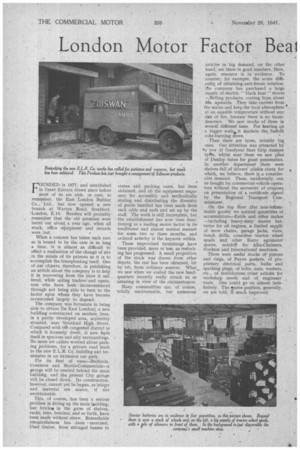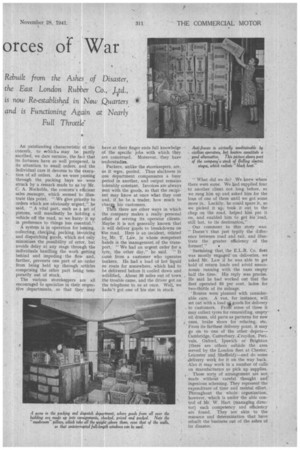London Motor Factor Beal orces of War
Page 24

Page 25

If you've noticed an error in this article please click here to report it so we can fix it.
FOUNDED in 1877, and established in Great Eastern Street since before most of us are able, or care, to remember, the East London Rubber Co., Ltd., has now opened a new branch at Walton Road, Stratford, 'London, E.15. Readers will probably remember that the old premises were burnt out about a year ago, when all stock, office equipment and records
were lost. •
When a concern has taken such root as is bound to be the case in so long a time, it is almost as difficult to effect a realization of the change of site in the minds of its patrons as it is to accomplish the transplanting itself. One of our objects, therefore, in publishing an article about the company is to help it in recovering from the blow it suffered, while aiding traders, and operators who have been inconvenienced through not being able to turn to the factor upon whom they have become accustonled largely to depend.
The company was fortunate in being able to obtain in East London) a new building constructed on modern, lines, in a partly developed area, accessibly situated, near Stratford High Street. Compared with tile congested district in which it formerly dwelt, it now fieds itself in spacious and airy surroundings. ■ No more are callers worried about parking problems, for a private road leads to the new E.L.R. Co. building and terminates in an extensive car park. Vir its fleet of vans--Bedfords, Comtners and Morris-Commercials--a garage will be erected behind the main building, and the present City gatage will be closed down. Its construction, however, cannot yet be began, as labour and material are scarce, if not unobtainable.
This, of course, has been a serious problem in fitting up the main tiuilding, but bricksi in the guise of shelve, racks, bins, benches, and so forth, have been made without straw. Remarkable reeourcefulness has .been exercised. Used timber, from selvaged beams to crates and packing cases, has been obtained, and all the equipment necessary for accessibly and methodically storing and distributing the diversity of goods handled has been made from such odds and ends and set up by the staff. The work is still incomplete, but the establishment has now been functioning as a leading motor factor in its traditional and almost normal manner for some two or three months, and ordered activity is the keynote within.
These improvised furnishings have been provided, more or lees, as restocking has progressed. A small proportion of the stock was drawn from other depots, the rest has been obtained, bit by bit, from ordinary sources. What. we saw when we visited the new headquarters recently really struck us as Amazing in view of the circumstances.
Many commodities are, of course, totally unobtainable, but numerous
articles in big demand, on the other hand, are there in goed numbers. Here, again, resource is in evidence. To counter, for example, the acute difficulty of obtaining, anti-freeze solution, the company has purchased a large supply of electric " black heat " stoves ---,Belling products, costing from about 33s. upwards. They fake current from the mains and keep the local atmosphere'. at an equable temperature without any risk of fire, because there is no incandescence. We saw stocks of these in several different eizes. For heating on a bigger scale. it markets thee Suffolk coke-burning Jove.
Then there are tyres, notably big, ones. Our attention was attracted by ea row of Goodyear Sure Grip dumper tyMs, whilst near them we saw piles of Dunlop tubes for giant pneumatics. In another department there were shelves full of drivers' oilskio coats', for • which, we believe, there is a consider• able demand. These, incidentally, can be bought by. commercial-vehicle operators without the surrender of coupons on presentation of a. certificate signed by the Regional Transport Commissioner.
On the top door .(for non-inflammable goods) we noticed quantities of accumulators—Exide and other makes —including heavy-duty starter batteries for oil engines, a limited supply of snow chains, garage jacks, vices, bench drills, countless tractor wheel spuds and other Kerry agrimotor spares, notably for Allis-Chalmers, Fordson and International Machines.
There were useful stocks of' pistons and rings, of Payen gaskets, of proprietary electrical parts, bulbs and sparking plugs, of bolts, nuts, washers, etc., of multifarious other articles for workshop needs and of engineers' tools. One could go on almost indefinitely. The spares position, generally, we are told, re much improved.
An outstanding characteristic of the concern, to exhich, may be partly ascribed, we dare surmise, the fact that its fortunes have so well prospered, is its attention to small orders, and the individual care it devotes to the execution of all orders. As we were passing through the packing bays we were struck by a remark made to us by Mr. C. A. Nockolds, the concern's efficient sales manager, which seemed to illustrate this point. "We give priority to orders Which are obviously urgent," he said. " A vital part, such as a set of pistons, will manifestly be holding a vehicle off the road, so we hurry it up in preference to things less essential."
A system is in operation for issuing, collecting, checking, packing, invoicing and dispatching goods, which not only minimizes the possibility of error, but avoids delay at any stage through the individuals handling the work getting behind and impeding the flow and, farther, prevents one part of an order from being held up through articles comprising the other part being temporarily out of stock.
The various storekeepers are all encouraged to specialize in their respective departments, so that they may have at their finger ends full knowledge of the specific jobs with which they are concerned. Moreover, they have understudies.
Packers, unlike the storekeepers, are, as it wgre, pooled. Thus slackness in one department compensates a busy period in another, and output remains tolerably constant. Invoices are always .Sent with the goods, so that the recipient may know at once what they cost and, if he be a trader, how much to chargg his customers.
Thrn there are other ways in which the company makes a really personal affair of serving its operator clients. Maybe it is not generally known that it will deliver gods to breakdowns on the road. Here is an incident, related by Mr. T. Law, in whose Competent hands is the *management of the transport. "We had an urgent order for a tyre, the other day," he said. "It came from a customer who operates tankers. He had a load of hot liquid en route for somewhere, which had to be delivered before it cooled down and solidified. About 30 miles out of town the trouble came, and the driver got on the telephone to us at once. Welt, we hadn't got one of his size in stock. " What did we do? We knew where there were some. We ttad supplied four to another client not long before, so we rang him up and, asked him for the loan of one of them until we got some more in. Luckily, he could spare it, so we picked it up, took it out to the chap on the road, helped him put it on, and enabled him to get his 'load, still hot, to its destination.."
Our comment to this story was: " Doesn't that just typify the difference between road and rail, and illustrate the, greater efficiency of the former! " •
Surmising that the E.L.R. Co. fleet was mostly engaged' on deliveries, we asked Mr. Law if he was able to get hold of return loads and avoid uneconomic running with the vans empty half the time. His reply was precise. He said he had worked out that the fleet operated 50 per cent. laden for two-thifds of its mileage.
• Routes were planned with considerable care. A van, for instance, will set out with a load c goods for delivery to customers. From' some• of these it may collect tyres for remoulding, emptyoil drums, old parts as patterns for new
, ones, brake shoes for refacing, etc.
• From its farthest 'delivery point, it may go on. to one of the other depots— Cambridge, Canterbury, Croydon, Perivale, Oxford, Ipswich or Brighton (there are others outside the area served by the London fleet at Chester, Leicester and Sheffield)—and do some delivery work for it on the way back. ,Also it may work in a number of calls on manufacturers to pick up supplies. . Those sorts of arrangement are not made without careful thought and ingenious scheming. They represent the expenditure of time and mental effort. Throughout the whole organization, however, which is under the able control of Mr. W. Hart (managing director) such competency and efficiency are found. They are akin to the resource and determination that have rebuilt the business out of the ashes of its disaster.




















































